Press Reaction to the November 2018 speech by Dr. Peter Navarro, Director of the White House Office of Trade and Manufacturing Policy, was biased in a negative direction.
Journal of Political Risk, Vol. 7, No. 12, December 2018

President Donald Trump in the Roosevelt Room. Trump signed proclamations that imposed a 25-percent tarriff on imported steel and a 10-percent tarriff on imported alumninum. Source: The Epoch Times via Flickr.
Anders Corr, Ph.D.
Publisher of the Journal of Political Risk
Dr. Peter Navarro, Director of the White House Office of Trade and Manufacturing Policy, gave a speech on November 9 at the Center for Strategic and International Studies (CSIS) in Washington, D.C. The title of the speech was “Economic Security as National Security”, which Dr. Navarro, a Harvard-educated economist, argues is the maxim of the Trump Administration. After the speech, Dr. Navarro was attacked in the media, but not about his main points. The negative, and one might argue biased, coverage came from the Wall Street Journal, CNBC, the Atlantic, and Director of the National Economic Council, Larry Kudlow, among others. The negative response centered on Dr. Navarro’s controversial claim that Wall Street elites have undue influence on U.S. policy having to do with China. Tempers were likely frayed at the time due to planning, negotiations and internal maneuvering in advance of a high stakes late November meeting then being planned between Presidents Trump and Xi Jinping at the G-20 meeting in Argentina. Worries were high that lack of progress on at least the outline of an agreement at the meeting could lead to deepening tariffs between the countries, and fears in the financial sector of falling stock markets or even a recession. But the bias and infighting of the attacks were unbecoming of these media outlets, and of Mr. Kudlow, the Director of the National Economic Council.




